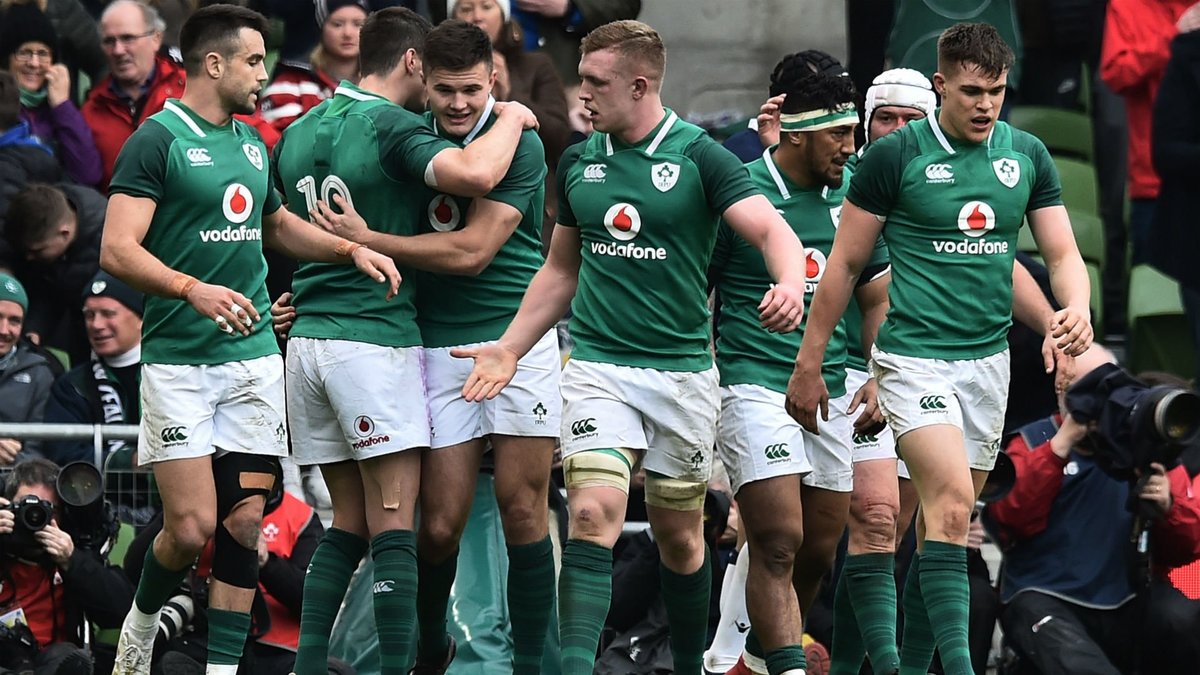The Breakdown: Wales 96% lineout success and other statistics ahead of Super Saturday

Ireland head into the final weekend of this year’s Six Nations looking to secure the Grand Slam at the home of former champions England.
Joe Schmidt’s side put paid to England’s hopes of a clean sweep in the concluding fixture in 2017, so Eddie Jones’ men will be out to spoil the St Patrick’s Day party.
Away from Twickenham, Italy are already assured of the wooden spoon having failed to register even a losing bonus point from their four matches.
The Azzurri’s opponents on Saturday are Scotland, who are involved in a four-way fight to secure second spot – a battle currently being won by Wales, who can make sure of finishing as runners-up if they secure a maximum haul at home to France.
With the help of Opta, we take a look at the best stats ahead of the championship’s conclusion.
The battle for second place is on…
Current #NatWest6Nations standings ? https://t.co/D9K06oXoRM#NatWest6Nations pic.twitter.com/vHmbJ7PNYh
— Guinness Men's Six Nations (@SixNationsRugby) March 14, 2018
Italy v Scotland
Scotland’s record on the road does not make for pretty reading ahead of a trip to Rome – they have lost 17 of their last 19 away games in the Six Nations – although they may take comfort from the fact that their only two victories in that sequence both came at Stadio Olimpico.
Italy are on a dismal run, however, having lost their last 16 games in the Six Nations – the longest such run in the championship’s history.
Saturday’s clash is unlikely to be a high-scoring affair, with Italy (65) and Scotland (72) scoring the fewest points this season. Gregor Townsend’s men have also crossed for a joint-low tally of seven tries, along with France.
Regardless of the result, there will be reason for Italy to celebrate with Sergio Parisse set to equal legendary former Ireland centre Brian O’Driscoll’s record of appearing in 65 Five and Six Nations matches.
1??0?? anni dopo, l'emozione è sempre la stessa!
il drop di Andrea Marcato alla Scozia nei minuti finali del test del 2008 al Flaminio#ITAvSCO pic.twitter.com/6aeJhYfrII
— Italrugby (@Federugby) March 15, 2018
England v Ireland
Should Ireland prosper at Twickenham, they will complete the Grand Slam for just the third time, having previously done so in 1948 and 2009.
This is the eighth time England and Ireland have met on the final day of the Six Nations – the men in green edge the win count 4-3.
The Grand Slam has been on the line on four of those occasions, Ireland denying England three times while Clive Woodward’s all-conquering side got the job done in 2003.
England can feel confident of upsetting the party, having won their last 15 home games in all competitions, but Ireland come into the game on the back of winning their last 11 Test matches – their longest ever such run.
#ENGvIRE | Eddie Jones gives you the lowdown on his England squad to face @IrishRugby on Saturday ?
More here: https://t.co/6U0rdDacKZ pic.twitter.com/fXsWoeGLby
— England Rugby (@EnglandRugby) March 15, 2018
Wales v France
The respective recent records of these two sides point to a Wales win – Warren Gatland’s side have won seven of their last eight at home while France have lost seven of their past nine on the road.
Wales may want to target the lineout as a route towards victory, boasting a tournament-high success rate of 96 per cent while Les Bleus’ 78 per cent is the worst in the competition.
A win for Wales will be their 250th in Four, Five and Six Nations history, a tally matched only by England (258).
Mathieu Bastareaud was named as France captain in place of the injured Guilhem Guirado and the bruising centre has had quite the impact this year, with only Scotland’s John Barclay (six) winning more turnovers than Bastareaud or Wales’ Josh Navidi (five).
The Duke of Cambridge, Patron of @WelshRugbyUnion ? will attend the Wales ??????? vs France ??@SixNationsRugby match on Saturday. ? During his last visit to the Principality Stadium, The Duke met with beneficiaries of the Welsh Rugby Charitable Trust pic.twitter.com/kdO4DQXfSK
— The Prince and Princess of Wales (@KensingtonRoyal) March 15, 2018








































